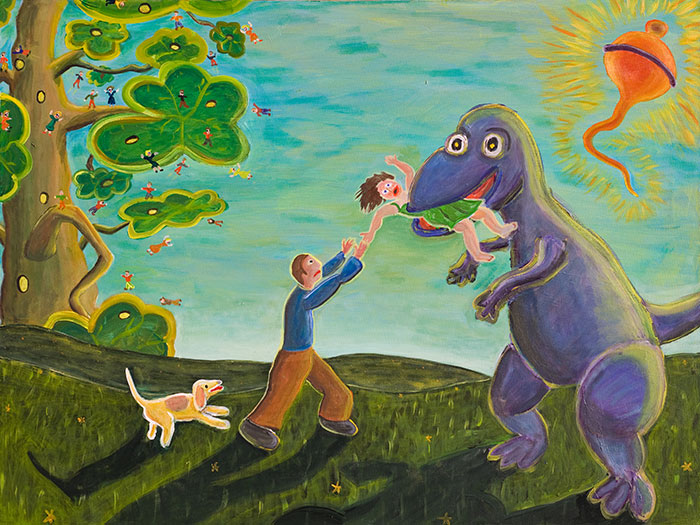
Ticks
by Robert Guffey

I.
John Driscoll entered the hospital room, his hat held respectfully in his hands. The nurse pointed at Ann Darrow, sleeping in the room’s solitary bed, and whispered, “She’s been out for the past two hours.” Despite the hordes of dead and dying overflowing into the halls, they had been kind enough to give her her own room. The room smelled sterile and bitter, like disinfectant. Nothing at all like the ocean.
Somewhere behind him, down the hall, he could hear an old man groaning in pain.
Driscoll twisted the brim of his hat nervously. “Is... is she going to be all right?”
The nurse smiled. “The doctor says she’s going to be fine. She’s just tired is all.” Driscoll breathed a sigh of relief. The nurse continued, “I’ll let you stay, as long as you don’t try to wake her.”
“Oh, of course, of course.”
“Normally I wouldn’t let you do this, but... well, you’ve been through a lot.”
Driscoll laughed, the first time he’d done so in a long time. “Well, ma’am, I guess you can say that again.”
The nurse patted his shoulder blade, then began to leave the room.
“Wait,” Driscoll said. The nurse paused in the doorway. “Uh, I was just wondering….” He didn’t know how to say it. “About Ann… was she…?” The nurse was staring at him expectantly. “Was she… harmed in any way?”
The nurse furrowed her brow. “No. I just said: she’s fine.”
“No, I know. But I mean, was she… harmed?”
“No.” The nurse glanced over at Ann, almost as if to confirm the fact for herself. “She’s sleeping. She’s fine.”
“Right, right. I can see that. What I want to know is… was she….” He’d twisted the hat into the shape of a wet towel. The nurse still didn’t understand what he was talking about. He decided to bail out of the conversation. “Thank you, ma’am, thank you.” He began backing away from her.
The nurse nodded, still confused. “You’re welcome.”
Driscoll turned his back on her and approached Ann’s bed. He heard the door close lightly behind him. He couldn’t hear the old man groaning anymore.
Even bruised and scratched, Ann still looked beautiful: her angelic face, her full red lips, her blonde hair draped across the pillow like strands of gold. He sat down in the hard-back chair beside the bed, and watched as her peaceful face contorted nightmarishly. “No, no,” she whispered, “don’t do that... don’t… touch me….” Her face relaxed as her fearful whimperings seemed to transform into moans of pleasure.
Driscoll’s fist tightened. He felt like slamming his fist into somebody’s face. He grabbed Ann by the shoulders and shook her awake. “Ann! Ann!”
Ann’s eyes snapped open, looked into Driscoll’s face. She tried to push away from him.
He wouldn’t let go of her. “What happened?” he said. “What did you let him do to you?”
Ann looked shamefully at the ground. “I….”
Before she could finish, screams erupted from the street below. Something dark and massive leaped past the window.
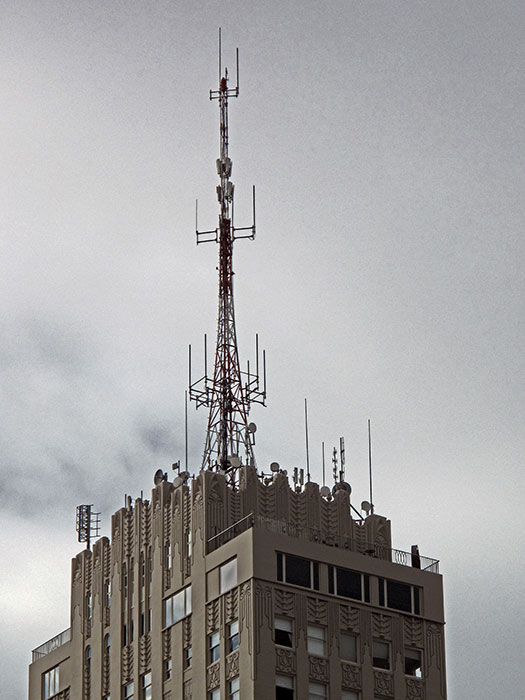
II.
I was the first person they contacted to study the epicenter of the destruction. The bodies weren’t even cold. They sent a military envoy to my home on Long Island for the express purpose of transporting me to Fifth and Broadway in Manhattan as quickly as possible. The entire ride there, I couldn’t help but think of how many lives would have been saved if only they had listened to me five weeks before.
I’m the acknowledged expert in my field, and yet my opinion was not at all appreciated when I wrote that guest editorial in the New York Times in which I warned the people of America of what might happen if they didn’t come to their senses and stop this insane exploitation. Did anybody take me seriously? Of course not. Instead they just twisted my argument into a Marxist screed against America and the free market.
I’d heard the destruction described on the radio, of course, but nothing could prepare me for what I saw spread out before us. Only Gustave Doré could have captured the apocalyptic horror of that frozen tableau: skyscrapers reduced to piles of blood-spattered rubble, mutilated survivors crawling through the ruins of their homes, children crying for mothers who lay dead or dying only inches away, biplanes lying in fragments in the middle of Broadway, the train cars of the Sixth Street Elevated exploded into metallic tatters, a chaotic mixture of flesh and steel. Innocent bystanders, blinded by the ubiquitous flames, running through the streets wailing in panic. I saw an old woman, whose flesh had burned away, screaming and crying and praying all at once, huddled in a ball amidst a pile of burning body parts.
I saw its prostate mass from blocks away. As the envoy neared Fifth Street, the body became more and more visible. The military boys had tried to prepare me for the sight, but of course no amount of preparation could suffice. Denham’s slogan was no hyperbole. It truly was the eighth wonder of the world.
“No reason to be scared,” said the soldier beside me. “The President’s coming soon.”
I tried not to laugh. I wanted to say, “The President can’t even save Wall Street. What’s he going to do about this?” Instead I chose to say nothing. I think he was trying to reassure himself more than me.
We screeched to a halt just outside the yellow lines the military had roped around the corpse. I saw its cranium first. Though its stomach was pressed to the ground, its head was tilted slightly to the left, giving me an opportunity to study the expression on its face. It looked very much like it was sleeping. The same peaceful expression I’d seen on a thousand apes a thousand times before. For a second, I grew worried that it really was sleeping. But no, no. The blood-drenched ground was adequate testament to its fate. Of course, it was difficult to distinguish the ape’s blood from the humans it had killed upon impact. My God, what a way to go.
And the smell. It permeated Broadway. It was not the stench of a rotting body; the beast hadn’t been dead long enough. It was more like the stench of every ape I’d encountered in my entire career confined to a five-block radius. Imagine the smell of feces and urine mixed with burning hair and you might have a close approximation of what Broadway was like that afternoon.
I spotted the General standing near the right ear lobe. (The ear alone was as large as the General’s head. It was hard to tell from my perspective, but the beast could have been anywhere from twenty to twenty-five feet high.) I was about to call out his name when a man broke through the crowd, pushed aside one of the soldiers, and grabbed the General’s thick wrist.
“What’re you doing?” the man yelled. “You can’t do this, this is my property, I—!”
I recognized his voice first. How many times had I heard it on the radio these past few weeks? (Too many.) Yes, it was none other than Carl Denham. Impresario. Hollywood film director. Explorer. Mad man.
“I wish the planes had taken you out too,” the General said and slugged Denham in the jaw, dropping him to the ground. Despite his advanced years, the General still packed a hell of a wallop.
Two soldiers emerged from the crowd and pulled Denham up by his shoulders. He looked pretty bad. How quickly the wheel turns. Twenty-four hours before, he had been the talk of the town; now he was reduced to a gibbering idiot. “It wasn’t the airplanes,” Denham raved, “it was beauty killed the beast!”
“What the hell’re you talkin’ about?” one of the soldiers said. As they began to drag him away, I jumped out of the jeep and ran toward them. “Wait, don’t!” I shouted.
“Not another nut,” the General said. “Who’re you?”
“Dr. Douglas Burden.”
“Oh, the ape guy. Jesus, I’m relieved.”
How I loved being called that. As if my entire career in Biology had been spent studying primates.
“We need you,” the General said. “We need somebody. I don’t know what the hell’s going on. One minute everything’s fine, the next we’re in the middle of the god damn apocalypse.” The General stared at all the destruction surrounding him. He seemed genuinely disturbed, as if he might break down whimpering at any moment.
I said, “Let’s try to remain calm, okay? I’d like Denham to stay. He knows more about this… this thing… than anybody else. He might have information we need, information he doesn’t even know he has.”
“This, clearly, is a man of great wit and perception,” Denham said to the two soldiers. “And you definitely need one around here.”
The General blustered. He seemed to be on the verge of punching Denham again until I stepped between them and placed my hand on the General’s epaulettes.
“General, please, you called me down here for my advice. If you don’t want to listen to what I have to say, I’ll go home.”
“I wanted your advice about apes, not—!”
“Apes, people—there’s really very little difference, sir.”
Eventually, the General calmed down and ordered the soldiers to release Denham.
“About time,” Denham said, smoothing out his rumpled coat. “If I don’t start getting some respect around here, I might be forced to sue someone.”
The General barked out a frustrated laugh. “By the time the city of New York gets through with you, you’ll be lucky to have a single cent in your pocket.”
Denham waved his hands in the air. “No, no, I can’t be sued for an act of God.”
The General pointed at the giant ape. “You call that an act of God?”
“The laws are very clear. I checked out all the legal ramifications before I initiated this project. In fact—”
The General was barely able to keep himself under control. “How can you stand there and call the death of thousands of people a ‘project’? How can you—?”
“Let’s leave all this legalistic crap for another time,” I said. “Right now we’ve got a somewhat more acute problem on our hands.” A gust of wind blew the stench of blood and vomit into my face. I felt as if I were going to gag. I began to cough instead. “How long has this body been lying here?”
“About thirteen hours,” the General said.
“Have either of you ever been around a dead ape for any length of time?”
“Well, I shot a rhinoceros in Africa,” Denham said. “Got it right between the eyes. Everybody told me not to risk it, but it didn’t scare me. Nothin’ scares me. I don’t quit. Ever.”
I sighed. “How about a dead dog then?”
“I had to bury my little girl’s dog in the back yard once,” the General said. “But that was years ago.”
“I wish you’d paid attention to what happened to it,” I said. “When the body begins to cool, you see, it’ll eventually be abandoned by—”
One of the soldiers who had been restraining Denham pointed above our heads and shouted, “Holy Toledo! What the fuck is that?”
I spun around and saw the fur on top of the ape’s head beginning to ripple strangely, as if something were crawling just beneath the surface.
The tick leaped off the ape’s head. The General screamed like a woman as the thing landed on his chest and sank its proboscis into his throat. The insect was the size of a fist. The General ripped the creature away,—pieces of flesh tearing away with it—and tossed it on the ground. The soldiers open fired on the insect. Its body burst open like an overripe watermelon. Bright, fresh blood sprayed the crowd.
“Jesus Christ,” Denham whispered. His mouth was dripping with tick blood.
I thought, It’s too late. I looked up at the ape’s sleek, black fur.
The entire body was beginning to ripple.
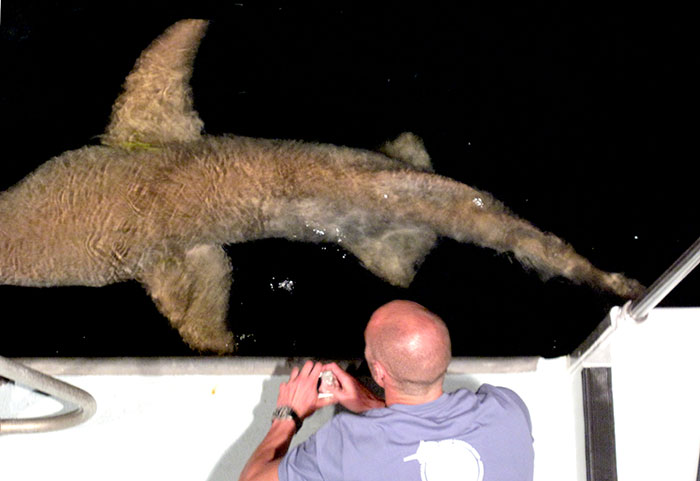
III.
Something dark and massive….
Driscoll ran over to the window, wondering if the madness was beginning again, expecting to see the monster coming right at him. Instead, a swarm of black insects, larger than any he’d ever seen before, leaped past silently en masse. He searched out the source of the screams. A horde of pedestrians were running down the middle of the street, a tide of giant, leaping ticks not far behind them.
It was stunning how high they could reach. One of them missed its jump and slammed into the third floor of the hospital, just a few feet from Ann’s window. The resultant sound was like a tomato dropping onto a linoleum floor. It remained stuck to the brick for a few seconds, then began sliding down the wall ever so slowly. The screams grew louder as the crowd drew nearer.
“What is it?” Ann said from the bed. “Is it him? Is he… is he coming back for me?”
Driscoll’s grip tightened on the window sill.
She didn’t sound afraid.
IV.
From Dr. Burden’s private journal:
Sep. 9 th, 1933
Ironic that Denham should be the first. I try to convince myself over and over again that he deserved it, but I’ve grown too close to him over the course of these past few months to really believe it. Beneath his cocky exterior was a man who cared, who wanted to change the world. He succeeded, of course, but not in the way that he intended.
Who could have known? We all thought artillery and bombs and mortar shells would wipe out the infestation. In time, perhaps it will. In time. But who among us could have predicted the disease?
How long had Skull Island been hidden from modern man? It should have been obvious—only natural to assume—that along with a horde of unimaginable life forms, a horde of unimaginable diseases would have survived as well.
Denham bled from every orifice for three weeks before he finally let go.
V.
An encrypted message on display at the Washington D.C. Military Museum:
FIELD REPORT TO HQ--#16-5506:
SITUATION WORSENED. ENTIRE BATALLION DESTROYED. TICKS BROKE THROUGH CORDON. HAVE INFESTED MARYLAND. MY TEAM AND I WILL TRY TO REACH SAFE HOUSE IN VIRGINIA. NEED MORE TIME TO WORK ON THE VACCINATION. PLEASE SEND HELP. NEED EQUIPMENT. WE MIGHT HAVE THE SOLUTION SOON.—D. BURDEN
[This message has been translated from the Navaho language. During the Great Infestation, military communiqués were always encoded in order to prevent foreign enemies from knowing how dire the situation was on the domestic front.]
VI.
Dec. 29 th, 1933
What a year, what a year. It began bad and ended even worse. Who could have guessed in January that by the end of the year a quarter of the population of the Eastern Seaboard would have been wiped out? My entire team has succumbed to the disease. They wasted away so rapidly, as if thirty years had been compressed into thirty days. Why haven’t I been affected yet? Is there something inside me that’s immune? Perhaps the answer to developing the vaccine lies within my own body. Perhaps… God, I don’t know if the vaccination will ever be complete.
I managed to squeeze the information out of them at last. I now know where they took the ape’s body. Apparently it’s being held in a secret military base somewhere on the West Coast. They want to fly me there to study it. Their oh-so-brilliant minds can’t unravel the mystery, so they run to me for the answer—the man they should’ve entrusted with the problem in the first place. The military’s obsession with secrecy is out of control. They’re addicted to it. The way things are going, I might as well be living in Germany.
* * * * *
Dec. 30 th, 1933
It seems as if the whole world’s going to hell. The Weimar Republic has fallen at last. Germany has elected a new Chancellor. There are rumors of a coming war in Europe. And the insects have spread to Mexico.
Happy New Year.
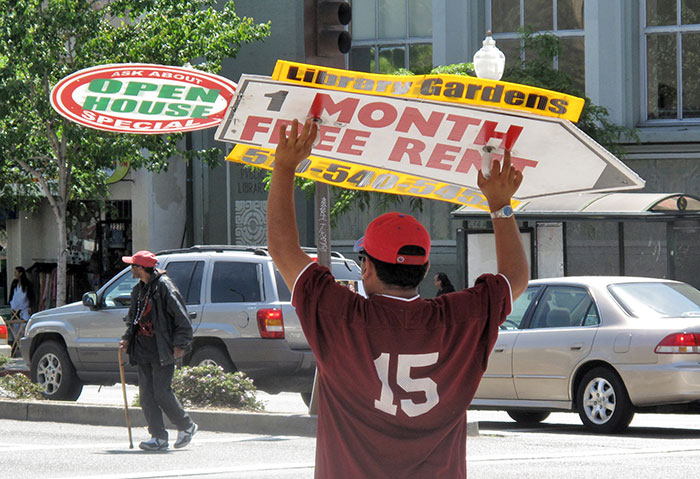
VII.
Driscoll knocked back a shot of Jack Daniels, stared longingly at the newspaper clippings of him and Ann all dressed up for the big premiere—right before the world turned to hell. How could a day start so right, and end so damn wrong?
He was living (existing?) in a seedy, one-room dive in the Red Hook section of Brooklyn. With nowhere else to go, he’d hoped to return to the Venture. Captain Englehorn had put a stop to that escape route only a couple of days ago. Washington’s quarantine of New York was still in effect, and it didn’t look as if the new Roosevelt administration was going to lift it any time soon. Like all the other ships unlucky enough to have docked in Manhattan on that infamous spring day [April 10th, 1933], the Venture was not allowed to return to the sea. The risk of spreading the disease to other countries was too great.
Driscoll stared at his distorted reflection in the bottom of the shot glass, grunted in anger, than tossed it at the peeling, cracked wall. This was all Denham’s fault. If Denham had shelled out some extra dough for stronger chains, the damn thing never would’ve gotten loose. And if it hadn’t gotten loose, Ann never would’ve—
He wished he could pay Denham back for everything he’d done. Unfortunately, Denham wasn’t around anymore. The disease had gotten to him first. Now there was no opportunity for revenge. No opportunity for release.
Driscoll called her on the phone two days ago. Tried to apologize. He never would’ve called her that name if he hadn’t been drinking. And he never would’ve been drinking if not for the memories tearing at the inside of his skull. If he could only extract the images from his head somehow, if he could only forget, everything would be fine. He and Ann could go back to being the way they were. They could—
He reached out for the phone, intent on calling her for the fifth time that day—then jumped nervously when it rang. He just stared at the phone, disbelieving. Nobody ever called him. Nobody knew he was here. Maybe… maybe it was her.
He picked up the receiver, cleared his throat, and said, “Hello?” Did he slur the word? God, he hoped he didn’t sound too drunk.
“Mr. Driscoll?”
A man’s voice. “Yeah.” It’s not her. “What do you want?”
“You’re a difficult man to get a hold of. You don’t know me, but my name is Dr. Burden. Can you hear me?”
Not her. “Barely.”
“I apologize. This line is bad. I’m calling all the way from the West Coast. Listen, I’ve been assigned to studying the cadaver.”
It took Driscoll a few moments to understand what Burden was referring to. “Oh, God,” he said. “Listen, I don’t want to hear anymore—”
“Believe me, I understand. Sometimes I wish I’d never laid eyes on it either. But the fact is, it has to be studied. We have to reverse the disease.”
“What does that have to do with me?”
“Have you ever wondered why you and Ms. Darrow appear to be immune?”
“No. I haven’t had time to wonder about anything.” He stared at the glass fragments spread across the wooden floor. Where was he gonna get another shot glass this early in the morning? He’d just have to start drinking straight from the bottle.
“I understand, Mr. Driscoll, you’re a busy man. So am I. But your country needs you.”
“What the hell for?”
“We’d like to fly you to the West Coast. We need to test you, figure out why you seem to be immune. You and Ms. Darrow spent more time with the beast than anybody, and yet you’re not dead.”
“Just my dumb luck.”
Silence. “Are you drunk, Mr. Driscoll?”
“Why do you say that?”
A sigh. “Will you please come?”
“Hell, I dunno….”
“I, uh... understand you and Ms. Darrow have been separated for some months now.”
Driscoll’s fingers dug into the bed spread. “Yeah, what of it?”
“Ms. Darrow has already agreed to come. It’s too bad you can’t be quite as patriotic as her.”
“Ann… Ann’s going?”
“Probably already on her way.”
Driscoll managed to rise to his feet without stumbling. “Yes. I’ll do it.”
“You’ll be leaving tomorrow morning. Please stay where you are, let us come get you. All you have to do is give me your address.”
Driscoll stamped his foot on a shard of glass. It cracked like a monkey’s spine. For the first time in months, he felt genuinely hopeful.
VIII.
Mar. 25 th, 1934
How else could I convince him? It was unavoidable. For the good of the country. Yeah, just keep telling yourself that.
I have no idea where Ann Darrow is. The only information I have is that she left her apartment two days ago with a small bag of luggage in her hand, and nobody’s seen her since. Perhaps she decided to return to the anonymity of the streets. Where Carl Denham first “discovered” her.
When all this is over, I hope Driscoll will be able to forgive me.
IX.
Driscoll slammed his fist into Burden’s face and the cartilage in his nose crunched loudly and the good doctor toppled over onto the antiseptic tiled floor.
They were five miles underground. Driscoll hadn’t seen real sunlight in four years.
“It was all for nothing!” Driscoll screamed. Two armed guards grabbed Driscoll from behind and held him in place—just barely.
“I’m sorry,” Burden said, trying to stop the bleeding with the heel of his hand. “I-I didn’t know. I thought—”
“You thought? You thought what? That you’d steal four years of my god damn life, that you’d just—”
A nurse hurried into the medical room with a dripping needle held delicately in her gloved hand.
“No!” Burden said, holding up his bloody palm. “Don’t. He’ll calm down.”
Driscoll started giggling. “Calm down. Yeah. I’ll just calm down.”
“Please, John,” Burden said. “Don’t make this more difficult than it has to be. The disease is only transmittable through blood. That’s why thousands of people like Denham died, but you and Ann didn’t. They were exposed to the ape’s blood through the ticks. It’s as simple as—”
“How long have you known this?”
Burden was silent for a moment. “We thought it was important to perform some more tests, just to make sure.” Driscoll winced, as if he’d been punched in the chest. “Damn it, you should be relieved. I want you to be able to leave here in one piece, man, but if you keep—”
A third M.P. ran into the room. “Turn on the radio!” he yelled. Tears streamed down his pale cheeks. He began ranting about Martians.
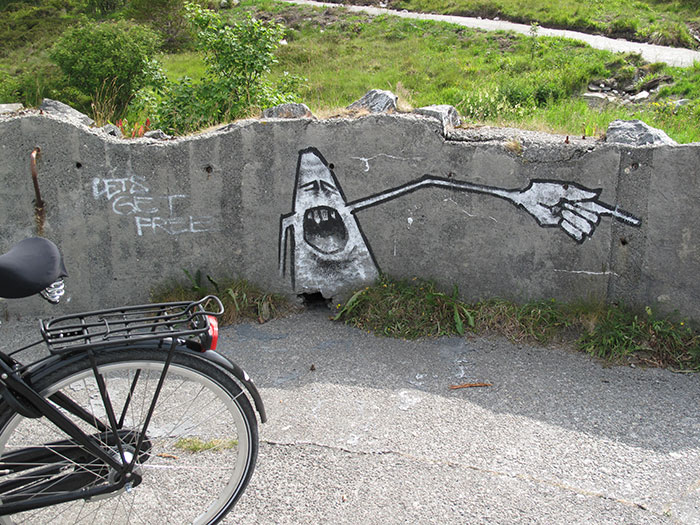
X.
Oct. 31 st, 1938
I turned on the radio tonight and heard a journalist named Carl Phillips reporting live from the crash site of a Martian craft somewhere near Grover’s Mill, New Jersey. Took me a half hour before I realized it was a fucking joke. Assholes.
I found myself hoping it was true. After all, maybe the Martians could do something about the insects.
* * * * *
Nov. 1 st, 1938
That broadcast last night got me thinking... why continue wasting our time with heavy artillery? One tick dies and three more pop up to take its place. Wouldn’t it be possible to design a biological agent that would affect only the ticks while leaving the rest of the population unharmed?
XI.
Extract from With Orson Welles by Peter Bogdanovich (Ballantine, 2006):
“Late one evening, around 11:00 p.m., Orson, Cybil and I were sitting at our usual table at Musso & Frank’s. The backing for The Other Side of the Wind had just fallen through for the fifteenth time, and he was pretty depressed. That’s usually when his eating grew out of control. But not tonight. The waiter had brought over a slice of key lime pie for me, and a small bowl of stewed kiwis for Orson. (Cybil never ate dessert.) He was just about to dig in when he leaned back in the chair and said solemnly, ‘You know, I still remember that day. I could see the streets clearly, even though I had a gas mask on. Later on I found out the mask was totally useless. I was protected from the virus. Everybody was. The streets... they were clogged with them. Like a black carpet on top of the snow. So many of them, just lying so still.’ Then he smiled. ‘It’s funny… even if I never make another movie, at least I can go to my grave knowing I helped save the world.’
“For a moment I thought he was pulling my leg again, in that Munchausen-like way of his.
“‘Oh, yes,’ he said, ‘didn’t you know? Douglas Burden told me himself one night in the Green Room while we were waiting to go on Carson. Burden even tried to convince General Leslie Groves to give me a medal, but Groves just glared at him and said….’ Orson paused for two beats, for dramatic effect, then bellowed, ‘“That man’s a fucking Communist!”‘ He burst into five minutes of non-stop laughter until tears were streaming down his flushed cheeks. Pretty soon Cybil and I were laughing too. Everyone at the restaurant was staring at us as if we were mad.
“We didn’t care. We were with Orson.”
XII.
Orson stood on the roof of Radio City Music Hall, a gas mask strapped to his face, watching the military planes zooming overhead. Everybody had been told to stay indoors, but Orson didn’t care. He wanted to see this firsthand. Macbeth had been cancelled tonight, and the entire cast was huddled in the basement hoping to begin work again soon. Despite the quarantine, people still needed entertainment. Orson found his work even more enriching than before. He’d been working for minimal fees for years now. In times like this, the imagination was more needed than ever.
“The lunatic, the lover, and the poet/Are of imagination all compact.” That was one of his favorite lines from A Midsummer Night’s Dream. He’d always been disappointed by the fact that he would never be able to play Puck. His stature and temperament didn’t permit it. The only role he would ever play was the King. That didn’t necessarily mean he was the best actor in The Mercury Theatre. He knew he wasn’t. He was just the most commanding, the one with the greatest presence. On the outside he was Julius Caesar; inside he was Puck.
The snow came down languorously, so gracefully. Far below Orson, amidst the pure white landscape, he saw a sea of black insects swarming over abandoned automobiles and fallen lampposts and the skeletons of the dead: fragments of twisted bone poking up out of the snow like strange leafless plants erupting from alien soil. Slowly, one by one, the ticks began to falter and stiffen and collapse: the human dead joined by their insect brethren.
It was coming to an end. Coming to an end, at last.
Behind the mask, Orson smiled. He realized, suddenly, that he was reliving the end of The War of the Worlds. It was the same story, given three dimensions, writ large upon the global stage. The entire script had already been written years before.
This confirmed something he’d always suspected. God was a damn plagiarist.
XIII.
Nov. 22 nd, 1940
I promised John he’d never have to see the corpse again once we were through here.
I’m afraid I spoke too soon. Despite the fact that the ticks have been eradicated, despite the fact that the vaccine seems to be working well, Groves believes we have further uses for the beast.
I have no idea what he means.
And that scares me… scares me to an extent I can’t fully describe.
* * * * *
Dec. 24 th, 1940
Rumors insist the military have set up a secret base on Skull Island. What could they possibly hope to find there?
XIV.
Extract from Kong: A Force For Peace In Our Times by Doris Kearns-Goodwin (Random House, 1984):
“According to Captain Englehorn’s log book, the exact location of Skull Island is S. Latitude 47° 9’, W. Longitude 126° 43’. The island appeared in all atlases published in 1934. For reasons unknown, the island is not mentioned in any atlas published subsequent to ‘34. Of course, islands deemed useful by the U.S. Department of Defense are often deleted from maps and atlases for reasons of national security.”
XV.
Front page headline of the 8-2-45 edition of the New York Times:
KONG DESTROYS HIROSHIMA
XVI.
Aug. 6 th, 1945
The bastards finally did it. I warned them, warned them this could only backfire on them. I worry. I worry about the Communist moles that have already infiltrated the project. How long before the secret slips out? How long before—Jesus, I just heard the people cheering on the news. Cheering. They actually think the war is over.
Pretty soon all the soldiers who might’ve died on the shores of Japan will be coming home, eager to procreate with their mates. Nine months in the future, expect an explosion of births all around the country. All those kids will grow up, enter kindergarten, fall in love, graduate high school... then die in some other useless war.
Keep cheering, people, keep right on cheering.
What if we survived the ticks only to end up killing ourselves?
* * * * *
Aug. 8 th, 1945
Two days ago Kong was bad. Now Kong is good.
Two days ago they used the name of Kong to frighten disobedient children. Now they’re manufacturing Kong dolls with an American flag gripped in its massive fist. Have you seen that new poster? You know the one I mean. It depicts Kong and a giant Uncle Sam, arms wrapped around each other in a brotherly fashion, traversing the Pacific Ocean with a confident stride; far in the background, the coast of Japan lay in ruins. And at the bottom of the poster it reads: WE’RE COMIN’ HOME NOW, MOM!
* * * * *
Aug. 9 th, 1945
I keep telling John he’ll be able to leave soon.
Even though I now know it’s not true. They never had any intention of letting him leave. And for no real reason.
There’s something addictive about secrets. You have to keep them going even when there’s no need for them anymore.
* * * * *
Aug. 10 th, 1945
I’ve decided. I have to leave this place, no matter what… no matter what promises I have to break… no matter who I have to leave behind.
I don’t know what they’ll do to him when I’m gone.

XVIII.
The Vietnamese emerged from the jungle on all sides, the explosive fire of their AK-47’s a marked contrast to the stormy July weather that held Quang Ngai province in its freezing, relentless grip. All around him he could hear nothing but screams laced with gunfire. His vision was obscured by the constant spatter of rain pelting him in the eyes. He tried to run, instead slipping, falling into a pool of rain water. The water was reddish-brown, the color of mud mixed with blood. Whose… whose blood…?
He heard somebody shout his name, glanced over his shoulder just in time to see one of his buddies get his head blown away. The skull, and the fragile flesh that surrounded it, exploded into a thousand tiny pulpy segments; the wind caught them, blew them into Joey’s gaping mouth. The taste of his friend was on his tongue. He swallowed involuntarily and fought the instinct to vomit. He felt a hand on his shoulder, spun around. Clarence was standing there. “Get me out of here!” Joey yelled, tears streaming down his mud-caked face.
“Hey, cool it, man, don’t sweat it,” Clarence said. He pointed up at the top of the trees with the barrel of his rifle. “We got Kong on our side!”
Joey followed the direction of the gun and saw the trees being ripped aside by a pair of powerful, hairy hands.
The Vietnamese shrieked in terror, darting away like insects. They might have been fast enough to get away from one Kong… but not two. Not three. Certainly not half a dozen.
The Kongs marched through the jungle, beating the American flag insignias branded into their breasts, plucking slopes out of the swamp as if they were nothing more than pieces of ripe fruit, tearing off their evil yellow heads with razor-sharp teeth, stamping out whole villages with only a few strides.
Joey and Clarence—one black soldier, one white soldier—clenched their right fists, and in perfect synchronization thrust them in the air. A ghostly American flag appeared in the marmalade sky, rippling in the wind.
Be all that you can be, read the letters at the bottom of the screen.
And then the evening news resumed.
XVIII.
Extract from Kong Madness: American Imperialism in a Post-War World by Howard Zinn (Prentice-Hall, 1974):
“In his meticulous log book, Captain Englehorn recorded Skull Island’s exact location as S. Latitude 47° 9’, W. Longitude 126° 43’. Most of the atlases published in 1934 include the island in their maps. Atlases published subsequent to ‘34, however, fail to mention it. It’s quite rational to assume that the U.S. Defense Department may have had a hand in this. After all, it’s well known that islands deemed useful for national security are often deleted from maps and atlases.
“It is interesting to note that the Venture may not have been the first ship to discover the island. Gustaf Johansen, second mate of an Auckland schooner called the Emma, claimed that he and a crew of eight men landed upon an ‘unknown island’ on March 23 rd, 1925. The coordinates he gave for the island matched the ones Englehorn would later record. Johansen further claimed he and the crew were attacked by a ‘strange creature’ somewhere inland. Only Johansen survived the encounter. For years the local authorities were convinced that Johansen had fabricated the story in order to cover up multiple homicides.
“This report, though originally recorded in the April 18 th, 1925 edition of an Australian journal entitled the Sydney Bulletin, would have remained lost forever if not for the fact that it was later reprinted in a popular work of fiction published in the pages of Weird Tales magazine.”

XIX.
A man sits in a tiny room and stares at a faded photograph clipped from a newspaper decades ago. A man and a woman stare out at him from the yellowing newsprint. The woman is beautiful. Sometimes, just before waking, he thinks he remembers her name.
The photograph is the only object in the room that gives him any comfort at all. He’s pinned it to the wall beside his bed so he can look at it at night while he’s drifting off to sleep.
He has nightmares sometimes. He sees monsters. They seem so real. He acts badly, and the nurses come in and stick a needle in his arm. It hurts. He hopes they never do that again.
He wishes Doug were here. But Doug’s gone forever. He grows sad, even though he doesn’t know who Doug is.
As he grows older, the nurses seem to grow younger. They smile at him so sweetly. They never let him touch them. Oh, if just once one of them would reach out and take his hand and hold it, gently. If even for a second.
Sometimes, late at night, he masturbates into a plastic cup and whispers the name (or what he thinks the name might be). In the morning, a young man in a white uniform appears and takes the cup away. Later, he gets a new cup with his dinner.
He wishes somebody would explain why he’s here. He wishes somebody would tell him what year it is. He wishes somebody would tell him when he’s leaving. He wishes the woman in the fading photograph would reach out and touch him, gently. If even for a second.
And every night he dreams of the sea.
XX.
Feb. 16 th, 1967
They say Soviet China have created their own, have even deployed them in Southeast Asia. I wish I knew if that were true. I wish I hadn’t retired so early. I wish I still had contacts on the inside. I wish I knew how close we were to outright disaster. I wish I could leave the confining walls of this damn retirement home. I can’t stand the people here. They’re so fucking old. All the dying left-wingers here insist we should give Communism a chance.
I say, “Why don’t we try democracy for a change? Nobody’s tried that yet.”
They have no reply.
I flip on the TV. Morrie Schaffer is trailing one of the Kongs as the ape strides toward a burning Vietnamese village. A Buddhist monk sits in his path. The monk is not going to move. So Kong scoops him up with a single, swift swipe and tosses him into the fire... then moves on.
I’ve decided I want my tombstone to read, “I am death, the destroyer of worlds.”
* * * * *
Nov. 8 th, 1967
The photographer who was working with Morrie Schaffer last February just won the Pulitzer Prize for best photograph.
Burning Buddhist monks do it for you all the time.
* * * * *
Mar. 15 th, 1974
A reporter came to see me yesterday. I don’t know how he tracked me down. He pitied me. I could tell. He was so happy. Happy he wasn’t as old as me. Happy he wasn’t going to die. (No time soon, at least.)
He wanted me to repeat all the myths. Wanted to know how we defeated the ticks with good ol’ American know-how (not plain old dumb luck). Wanted to know how we managed to clone the first Kong. Wanted to know if Driscoll and Darrow were really still alive and living on Skull Island. Wanted to know what it was like to live through history.
“You must be proud, seeing what’s happening in Cuba today. 1933 was the worst year in America’s history. So many people were lost—not just to the disaster, but to the disease that followed. At the time, did you ever think you and your colleagues would be able to transform such a horrible disaster into the world’s salvation?”
I picked up my bed pan and tossed it in his face. He probably thinks I’m senile or crazy. Fine. Let him think that. Let him write whatever he wants. Journalism is for punks and liars. I used to think that only science told the truth. “If something can be done, it should be done!”
The Kongs have left El Salvador and are swarming upwards toward Guatemala. They just overthrew the democratically elected government of Nicaragua.
* * * * *
Mar. 27 th, 1974
Sometimes I wonder if John’s still alive. For his sake, I hope he isn’t.
I hope he’s been dead for a very long time.
* * * * *
Mar. 28 th, 1974
According to recent news reports, Africans are beginning to die of a mysterious disease. Some scientists are blaming the unusually high death rate on immunodeficiency, or syphilis, or just plain hunger.
Sometimes I wonder, though… I wonder about the biological agent I developed for use against the ticks….
And all I can do is keep on wondering.
* * * * *
April 1 st, 1974
I hope the myths are true. I hope Ann Darrow really isn’t dead, that she’s living out her remaining days on Skull Island in peace. I hope she found what she really wanted all along.
* * * * *
April 22 nd, 1974
They hit the stands today: Kong stamps, seventeen cents apiece.
* * * * *
April 23 rd, 1974
How many more Kongs can we make? How many myths do we have to kill before we’ll be satisfied? How many times does a myth have to be murdered and stomped on before it finally remains dead?
* * * * *
July 1 st, 1974
Just now, during a momentary lapse of sanity, I turned on the TV and saw the Kongs parachuting into Tel Aviv.
* * * * *
July 3 rd, 1974
I try to avoid watching TV these days, but sometimes it’s impossible. This afternoon I was walking through the rec room and caught a quick glimpse of the news. I saw an aerial shot of our troops invading Grenada: perfectly straight lines composed of anonymous black dots, following a trail of the largest footsteps ever seen by man. From that high in the air, our boys looked exactly like an army of ticks swarming over the warm body of the world.
At times like this, I wonder if I helped eradicate the wrong parasites.
About the Author
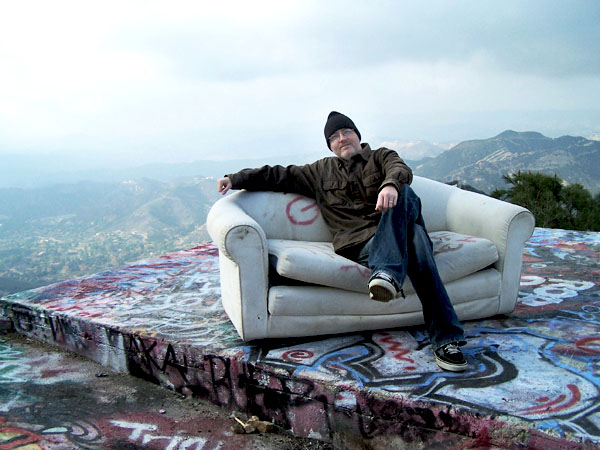
Robert Guffey’s short stories, articles and interviews have appeared in such magazines and anthologies as After Shocks, Alien Skin, Chimeraworld, The Chiron Review, Dark Jesters, Escape Clause, The Fortean Times, The HunterGatheress Journal, Like Water Burning, Modern Magic, Mysteries, New Dawn, The New York Review of Science Fiction, Paranoia, Particules, The Pedestal, Riprap, Steamshovel Press, and The Third Alternative. Further stories are scheduled to appear in Amazing Alternity Stories edited by Thomas Deja, Art From Art edited by Steve Soucy, and Allen Ashley’s forthcoming PS Publishing anthology Catastrophia. He is currently teaching English at CSU Long Beach and can be contacted at rguffey@hotmail.com.
Please mention the author or this piece's name in your comment.